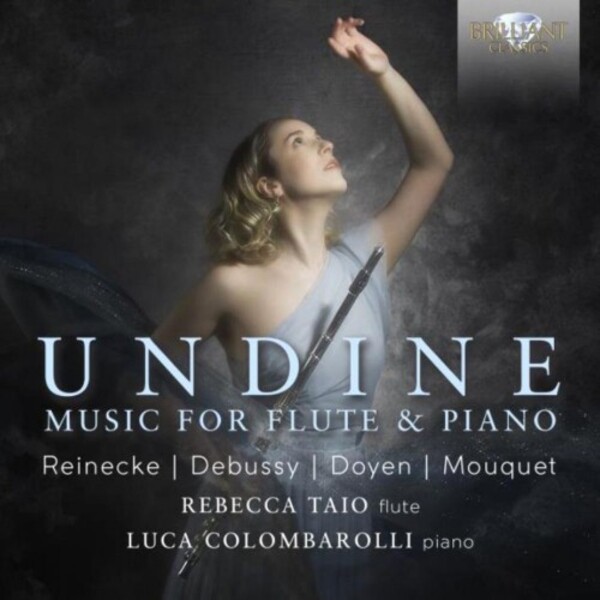
Undine: Music for Flute & Piano
£9.45
In stock - available for despatch within 1 working day
Despatch Information
This despatch estimate is based on information from both our own stock and the UK supplier's stock.
If ordering multiple items, we will aim to send everything together so the longest despatch estimate will apply to the complete order.
If you would rather receive certain items more quickly, please place them on a separate order.
If any unexpected delays occur, we will keep you informed of progress via email and not allow other items on the order to be held up.
If you would prefer to receive everything together regardless of any delay, please let us know via email.
Pre-orders will be despatched as close as possible to the release date.
Label: Brilliant Classics
Cat No: 96695
Format: CD
Number of Discs: 1
Genre: Chamber
Release Date: 7th October 2022
Contents
Works
Prelude a l'Apres-midi d'un faune (arr. Karl Lenski)Poemes grecs (5)
La Flute de Pan: Sonata for flute and piano, op.15
Flute Sonata, op.167 'Undine'
Artists
Rebecca Taio (flute)Luca Colombarolli (piano)
Works
Prelude a l'Apres-midi d'un faune (arr. Karl Lenski)Poemes grecs (5)
La Flute de Pan: Sonata for flute and piano, op.15
Flute Sonata, op.167 'Undine'
Artists
Rebecca Taio (flute)Luca Colombarolli (piano)
About
Reinecke is largely known for his flute music, which spans the 19th century, although his music still reveals the influence of the first German Romantics, particularly Mendelssohn and Schumann. Reinecke was inspired to write his Undine Sonata after reading Friedrich de la Motte Fouqué’s eponymous fairy tale, which suited the German Romantics’ penchant for the supernatural. The fairy tale describes the water-nymph Undine’s search for earthly love, and each of the four movements evokes a precise moment in the story. The work brims with emotion, inspired by the romantic allure of the protagonist.
Prélude à l’après-midi d’un faune, inspired by symbolist poet Stéphane Mallarmé’s L’Après-midi d’un faune, was written for full orchestra. Enraptured by the intensely sensual atmosphere of Mallarmé’s poetry, Debussy’s interpretation overflows with passion and exuberance. In this piece Debussy shows how the expressions of the soul can be transformed into sounds and beauty, offering glimpses of wonderment as well as myriad splashes of colour. The present version for flute and piano was made by Karl Lenski and derives from two sources: a little-known autograph particell from the estate of Alfred Cortot and Debussy’s own arrangement of the work for two pianos.
Inspired by the Debussian style, Albert Doyen wrote five Poèmes grecs. The use of whole-tone harmonies and the attention to fleeting, subtle sonorities are reminiscent of Debussy’s Prélude à l’après-midi. However, following the publication of Poèmes grecs, the young composer fell into complete obscurity.
Also influenced by Greek mythology is Mouquet’s best-loved work, La Flûte de Pan. Mouquet’s sonata presents three tableaux of the Greek god Pan: Pan and the shepherds, Pan and the birds, and Pan and the nymphs. The first movement is characterised by two themes, one evoking a mountain scene, the other representing Pan’s sweet singing. The music of the second movement is melancholic, reflecting the woodland solitude of Pan the god, whilst in the final movement the dance rhythms are interspersed with languid dreamy moments.
Rebecca Taio is a highly talented Italian flautist. She studied with Raffaele Trevisani and Patrick Gallois and participated in masterclasses by among others Barthold Kuijken and James Galway.
Error on this page? Let us know here
Need more information on this product? Click here